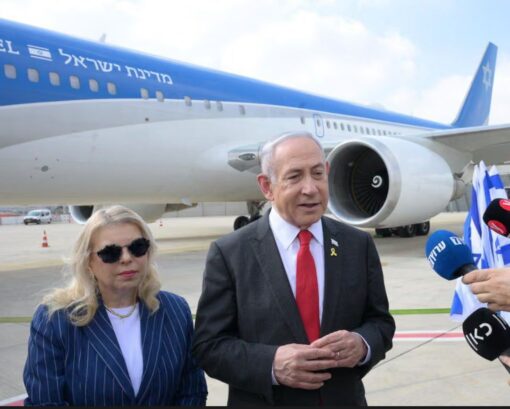Benjamin Netanyahu, Israel’s prime minister, took an unusually long and circuitous flight path to attend the United Nations General Assembly in New York, reportedly to avoid potential arrest under an international criminal court (ICC) warrant.
Flight-tracking data revealed that the Israeli leader’s plane, known as the Wing of Zion, bypassed several European countries, opting instead to follow a route along the Mediterranean Sea before crossing the Atlantic.
The ICC issued an arrest warrant for Netanyahu last year, citing alleged crimes, including the use of starvation as a method of warfare against Palestinians.
European countries that are signatories to the ICC statute would be legally obligated to detain Netanyahu should he enter their airspace, raising serious diplomatic and logistical complications for his travel.

While the Wing of Zion did traverse the airspace of Greece and Italy briefly, it then turned south towards the Strait of Gibraltar, avoiding a more direct flight path over France, Spain, Portugal, Ireland, and the United Kingdom.
French authorities had reportedly granted initial approval for Israeli airspace use, but the final flight plan deviated, possibly due to real-time security or legal considerations.
Israeli media reported that the longer route required additional fuel, leading some members of Netanyahu’s entourage and journalists to be left behind on this particular trip.
This marked the latest in a series of circuitous flights undertaken by Netanyahu, who has previously altered flight plans to avoid potential ICC enforcement.
In February, the Times of Israel cited the Israeli ambassador to the U.S., Yechiel Leiter, confirming that Netanyahu’s flight to Washington DC had been rerouted to avoid emergency landings in European countries.
Health concerns also played a role in the routing decisions. Netanyahu underwent prostate surgery in late 2024, requiring him to travel with medical personnel.
The flight plan deliberately remained near U.S. military bases in case an emergency landing became necessary. While the ICC warrant was a central concern, the combination of health considerations and legal risks shaped the unusual flight path.
France, under President Emmanuel Macron, has been increasingly critical of Israel’s actions in Gaza and has led diplomatic efforts to pressure Israel to halt hostilities and recognize Palestine.
Netanyahu has consistently opposed Palestinian statehood, making any European airspace crossings potentially fraught with political and legal risk.
The UN General Assembly remains a critical platform for Netanyahu. He is scheduled to address the international body and meet U.S. President Donald Trump, with both leaders rejecting the ICC’s authority.
The timing of Netanyahu’s arrival has raised questions about international law enforcement, airspace sovereignty, and diplomatic negotiations during a period of intense scrutiny over Israel’s actions in Gaza.
Flight tracking data shows that Netanyahu’s Wing of Zion has become increasingly sophisticated in avoiding jurisdictions where European courts could enforce ICC warrants.
Analysts suggest that the pattern of circuitous routing highlights both Israel’s concerns over international law enforcement and the complexities of high-level political travel amid global tensions.
Observers note that while Netanyahu’s itinerary has minimized legal risk during transit, it underscores the broader challenges facing international governance when a sitting head of state is subject to an arrest warrant.
The ICC relies on member states to enforce its decisions, yet political, logistical, and health considerations complicate enforcement measures.
This latest flight illustrates a broader trend in which Israeli leaders manage international legal risks while continuing active diplomatic engagement. Netanyahu’s careful maneuvering reflects the intersection of geopolitics, international law, and the personal safety of state leaders.
Experts emphasize that the legal and political stakes extend beyond Israel, highlighting potential gaps in enforcement and accountability mechanisms under international law.
While Netanyahu continues to assert Israel’s strategic priorities, including opposition to Palestinian statehood and ongoing military operations in Gaza, his travel decisions draw global attention.
The circuitous flight has become a symbol of the tension between international justice obligations and the practical realities of diplomacy and statecraft.
European governments and human rights organizations continue to debate the implications of allowing ICC-indicted leaders to transit safely through signatory airspace.
France’s initial permission contrasted with Netanyahu’s ultimate avoidance of French airspace, suggesting a delicate balance between diplomatic relations and legal obligations.
Netanyahu’s approach also raises questions about how nations with ICC obligations navigate political sensitivities when dealing with allied or strategically significant countries.
The flight demonstrates Israel’s ability to leverage logistical planning, diplomatic negotiation, and military-grade aviation resources to mitigate legal exposure while ensuring the prime minister can meet international commitments.

The ICC arrest warrant against Netanyahu remains a contentious issue. International legal scholars argue that enforcement depends on coordinated action by member states, yet practical considerations, including emergency landings and medical contingencies, complicate strict adherence.
Netanyahu’s flight provides a case study in the interplay between law, politics, and executive mobility on the global stage.
Netanyahu’s circuitous flight to the UN underscores the complex dynamics of international law, diplomacy, and personal security for world leaders under scrutiny.
By avoiding European airspace, Netanyahu has navigated both legal and political minefields, demonstrating the extraordinary lengths states will go to balance accountability with strategic objectives.
The flight highlights ongoing tensions between the ICC’s mandate, European member states’ responsibilities, and Israel’s determination to maintain sovereign decision-making amid international pressure.
Two-word Keyphrase: Netanyahu flight
Secondary Keyphrases: Netanyahu UN, ICC arrest, Israel Gaza, Netanyahu itinerary, Netanyahu Europe


